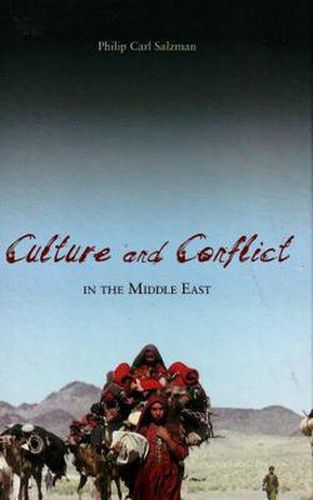Readings Newsletter
Become a Readings Member to make your shopping experience even easier.
Sign in or sign up for free!
You’re not far away from qualifying for FREE standard shipping within Australia
You’ve qualified for FREE standard shipping within Australia
The cart is loading…






In an era of increasing interaction between the United States and the countries of the Middle East, it has become ever more important for Americans to understand the social forces that shape Middle Eastern cultures. Based on years of his own field research and the ethnographic reports of other scholars, anthropologist Philip Carl Salzman presents an incisive analysis of Middle Eastern culture that goes a long way toward explaining the gulf between Western and Middle Eastern cultural perspectives. Salzman focuses on two basic principles of tribal organisation that have become central principles of Middle Eastern life - balanced opposition (each group of whatever size and scope is opposed by a group of equal size and scope) and affiliation solidarity (always support those closer against those more distant). On the positive side, these pervasive structural principles support a decentralised social and political system based upon individual independence, autonomy, liberty, equality, and responsibility. But on the negative side, Salzman notes a pattern of contingent partisan loyalties, which results in an inbred orientation favouring particularism: an attitude of my tribe against the other tribe, my ethnic group against the different ethnic group, my religious community against another religious community. For each affiliation, there is always an enemy. Salzman argues that the particularism of Middle Eastern culture precludes universalism, rule of law, and constitutionalism, which all involve the measuring of actions against general criteria, irrespective of the affiliation of the particular actors. The result of this relentless partisan framework of thought has been the apparently unending conflict, both internal and external, that characterises the modern Middle East.
$9.00 standard shipping within Australia
FREE standard shipping within Australia for orders over $100.00
Express & International shipping calculated at checkout
In an era of increasing interaction between the United States and the countries of the Middle East, it has become ever more important for Americans to understand the social forces that shape Middle Eastern cultures. Based on years of his own field research and the ethnographic reports of other scholars, anthropologist Philip Carl Salzman presents an incisive analysis of Middle Eastern culture that goes a long way toward explaining the gulf between Western and Middle Eastern cultural perspectives. Salzman focuses on two basic principles of tribal organisation that have become central principles of Middle Eastern life - balanced opposition (each group of whatever size and scope is opposed by a group of equal size and scope) and affiliation solidarity (always support those closer against those more distant). On the positive side, these pervasive structural principles support a decentralised social and political system based upon individual independence, autonomy, liberty, equality, and responsibility. But on the negative side, Salzman notes a pattern of contingent partisan loyalties, which results in an inbred orientation favouring particularism: an attitude of my tribe against the other tribe, my ethnic group against the different ethnic group, my religious community against another religious community. For each affiliation, there is always an enemy. Salzman argues that the particularism of Middle Eastern culture precludes universalism, rule of law, and constitutionalism, which all involve the measuring of actions against general criteria, irrespective of the affiliation of the particular actors. The result of this relentless partisan framework of thought has been the apparently unending conflict, both internal and external, that characterises the modern Middle East.